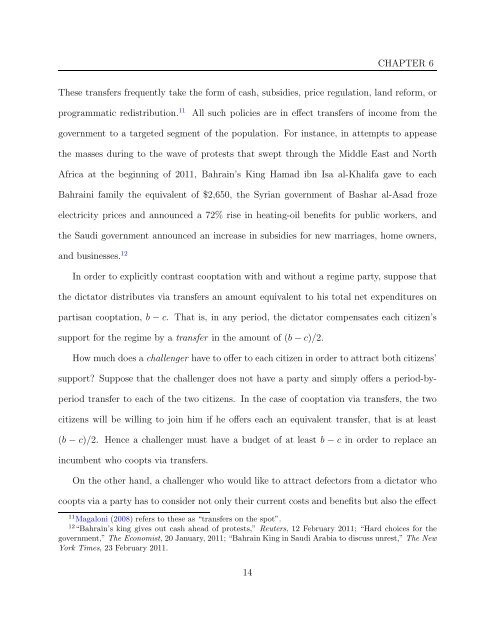Chapter 6 Why Authoritarian Parties? The Regime Party as an ...
Chapter 6 Why Authoritarian Parties? The Regime Party as an ...
Chapter 6 Why Authoritarian Parties? The Regime Party as an ...
You also want an ePaper? Increase the reach of your titles
YUMPU automatically turns print PDFs into web optimized ePapers that Google loves.
CHAPTER 6<br />
<strong>The</strong>se tr<strong>an</strong>sfers frequently take the form of c<strong>as</strong>h, subsidies, price regulation, l<strong>an</strong>d reform, or<br />
programmatic redistribution. 11 All such policies are in effect tr<strong>an</strong>sfers of income from the<br />
government to a targeted segment of the population. For inst<strong>an</strong>ce, in attempts to appe<strong>as</strong>e<br />
the m<strong>as</strong>ses during to the wave of protests that swept through the Middle E<strong>as</strong>t <strong>an</strong>d North<br />
Africa at the beginning of 2011, Bahrain’s King Hamad ibn Isa al-Khalifa gave to each<br />
Bahraini family the equivalent of $2,650, the Syri<strong>an</strong> government of B<strong>as</strong>har al-Asad froze<br />
electricity prices <strong>an</strong>d <strong>an</strong>nounced a 72% rise in heating-oil benefits for public workers, <strong>an</strong>d<br />
the Saudi government <strong>an</strong>nounced <strong>an</strong> incre<strong>as</strong>e in subsidies for new marriages, home owners,<br />
<strong>an</strong>d businesses. 12<br />
In order to explicitly contr<strong>as</strong>t cooptation with <strong>an</strong>d without a regime party, suppose that<br />
the dictator distributes via tr<strong>an</strong>sfers <strong>an</strong> amount equivalent to his total net expenditures on<br />
partis<strong>an</strong> cooptation, b−c. That is, in <strong>an</strong>y period, the dictator compensates each citizen’s<br />
support for the regime by a tr<strong>an</strong>sfer in the amount of (b−c)/2.<br />
How much does a challenger have to offer to each citizen in order to attract both citizens’<br />
support? Suppose that the challenger does not have a party <strong>an</strong>d simply offers a period-by-<br />
period tr<strong>an</strong>sfer to each of the two citizens. In the c<strong>as</strong>e of cooptation via tr<strong>an</strong>sfers, the two<br />
citizens will be willing to join him if he offers each <strong>an</strong> equivalent tr<strong>an</strong>sfer, that is at le<strong>as</strong>t<br />
(b − c)/2. Hence a challenger must have a budget of at le<strong>as</strong>t b − c in order to replace <strong>an</strong><br />
incumbent who coopts via tr<strong>an</strong>sfers.<br />
On the other h<strong>an</strong>d, a challenger who would like to attract defectors from a dictator who<br />
coopts via a party h<strong>as</strong> to consider not only their current costs <strong>an</strong>d benefits but also the effect<br />
11 Magaloni (2008) refers to these <strong>as</strong> “tr<strong>an</strong>sfers on the spot”.<br />
12 “Bahrain’s king gives out c<strong>as</strong>h ahead of protests,” Reuters, 12 February 2011; “Hard choices for the<br />
government,” <strong>The</strong> Economist, 20 J<strong>an</strong>uary, 2011; “Bahrain King in Saudi Arabia to discuss unrest,” <strong>The</strong> New<br />
York Times, 23 February 2011.<br />
14











